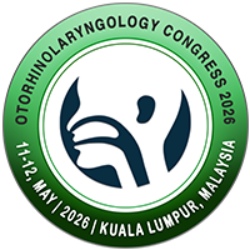Track: New treatment Advances in Otolaryngology

Session Overview:
This session aims to explore the latest breakthroughs and innovative treatment strategies in the field of otolaryngology. As the discipline continues to evolve, recent advancements have led to improved diagnostic capabilities, enhanced surgical techniques, and novel therapeutic approaches that significantly impact patient care and outcomes. The session will begin with an overview of minimally invasive surgical techniques, emphasizing their advantages in terms of reduced recovery times and lower complications rates. Participants will learn about advancements such as endoscopic sinus surgery, robotic-assisted procedures, and the use of navigation systems that enhance precision during complex surgeries. A significant focus will be placed on advancements in the management of head and neck cancers, including new surgical techniques, radiotherapy enhancements, and immunotherapy options that have transformed patient prognosis and quality of life. By the end of the session, participants will be equipped with the knowledge to implement these new treatment modalities into their practice, ultimately improving patient outcomes and satisfaction in the field of otolaryngology.
Recent Developments:
The field of otolaryngology has witnessed significant advancements in recent years, transforming the landscape of diagnosis, treatment, and patient care. These developments encompass a range of innovative approaches, including surgical techniques, medical therapies, and technological integration. In medical treatment, biologics and targeted therapies have shown promise for conditions like chronic rhinosinusitis and allergic rhinitis. New medications that modulate the immune response or target specific pathways in disease progression offer patients more effective options with fewer side effects compared to traditional treatments. Telemedicine has also emerged as a vital tool in otolaryngology, especially during the COVID-19 pandemic. Virtual consultations and remote monitoring have expanded access to care, enabling timely evaluations and follow-ups without the need for in-person visits. By integrating innovative surgical techniques, novel medical therapies, and advanced technologies, healthcare providers are better equipped to address the evolving needs of patients in this dynamic field.
Sub Tracks:
Biologic Therapies for Chronic Rhinosinusitis with Nasal Polyps:
This sub-track will explore the latest developments in biologic therapies targeting chronic rhinosinusitis, particularly in patients with nasal polyps. Discussions will focus on mechanisms of action, clinical efficacy, and the impact of these therapies on patient quality of life.
Minimally Invasive Endoscopic Ear Surgery:
Examine advancements in minimally invasive techniques for ear surgeries, such as tympanoplasty and mastoidectomy. This sub-track will highlight the benefits of endoscopic approaches, including improved visualization and reduced recovery times.
Advancements in Cochlear Implant Technology:
Delve into the latest innovations in cochlear implant technology, including enhancements in device design, sound processing, and patient outcomes. Discussions will also cover advancements in programming and post-implantation rehabilitation.
Robotic Surgery in Head and Neck Oncology:
This sub-track will focus on the role of robotic surgery in the treatment of head and neck cancers. Participants will learn about the techniques, advantages, and outcomes associated with robotic-assisted surgeries in oncologic procedures.
Novel immunotherapy approaches for head and neck cancer:
Explore the emerging field of immunotherapy in head and neck cancer treatment. Discussions will cover recent clinical trials, the mechanisms of action of various immunotherapeutic agents, and their potential to improve survival rates.
Gene Therapy for Inherited Hearing Loss:
Investigate the potential of gene therapy as a treatment for inherited forms of hearing loss. This sub-track will focus on current research, gene editing techniques, and the challenges and opportunities associated with translating these therapies to clinical practice.
Innovations in Sleep Apnea Management:
Examine the latest advancements in the management of obstructive sleep apnea, including novel CPAP devices, surgical interventions, and emerging therapies. Discussions will highlight the impact of these innovations on patient compliance and outcomes.
Targeted Therapies for Allergic Rhinitis:
Focus on new targeted treatment approaches for allergic rhinitis, including monoclonal antibodies and other biologic agents. This sub-track will discuss their mechanisms of action, efficacy, and place in the therapeutic landscape for allergic conditions.
Scientific Highlights
- Anatomical and Physiological Disorders of ENT
- Lung Disease Airway Issues
- ENT Infections and allergies
- New treatment Advances in Otolaryngology
- Ear & Nose plastic surgery
- Endoscopic and laparoscopic ENT surgery
- Craniofacial & Facial surgery
- Otology and Neurotology
- ENT Microsurgery
- COVID 19 and ENT
- Pediatric Otolaryngology
- Speech and Swallowing Disorders
- Head and Neck Surgery
- Airway Management & Surgery
- ENT Allergies & Immunotherapy
- Surgical Techniques in ENT
- Nasal Polyposis and Biologic Therapy
- Advances in Cochlear Implants
- Recent Advances in Otorhinolaryngology
- Vertigo and Balance Disorders


